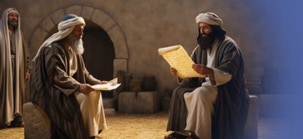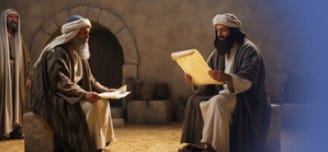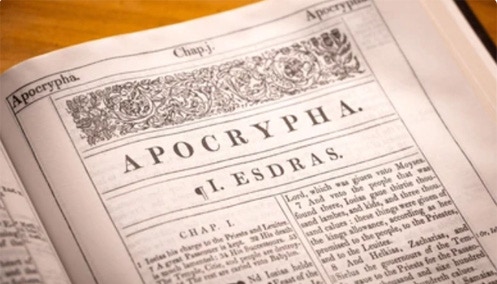


Common Objections
Common Objections
Catholic Outlook
Catholic Outlook

Catholic Outlook
Common Objections
Common Objections
__________ Recent Additions __________
Catholic Outlook
Catholic Outlook
__________ The “Apocrypha” __________
“No canon or council of the Christian church for the first four centuries recognized the Apocrypha as inspired.”
Gary Hoge

I found this objection in Josh McDowell’s book, Evidence That Demands a Verdict1, but McDowell was actually quoting from a book by Norman Geisler and William Nix.2 It’s one of those statements that’s technically true, but grossly misleading.
The truth is, no canon or council of the Christian Church for the first four centuries recognized any book as inspired, including the New Testament. According to the International Bible Commentary, an Evangelical Protestant reference book,
It was not until the year A.D. 393 that a church council first listed the 27 New Testament books now universally recognized. There was thus a period of about 350 years during which the New Testament Canon was in process of being formed.3
They are referring to the council of Hippo, which, in canon 36, produced the first official list of both the Old Testament and New Testament Scriptures. And they made no distinction between the “Apocrypha” and the other books of the Old Testament.4
Let me say that again: both the New Testament and the deuterocanonical books were officially canonized at the same time by the same council.
Now, the fact that the church waited until the late fourth century to officially recognize the inspiration of the 27 New Testament books doesn’t mean that they weren’t previously regarded as the inspired word of God. The bishops at Hippo didn’t just pull their list out of thin air, after all. On the contrary, as Protestant scholar F.F. Bruce observed,
When at last a Church Council – the Synod of Hippo in A.D. 393 – listed the twenty-seven books of the New Testament, it did not confer upon them any authority which they did not already possess, but simply recorded their previously established canonicity.5
But if that’s true for the New Testament, it’s also true for the Old Testament. The Synod of Hippo did not confer upon the deuterocanonical books any authority that they did not already possess, but simply recorded their previously established canonicity, right along with the other biblical books. This fact is confirmed by Protestant scholar J.N.D. Kelley:
[The Old Testament] always included, though with varying degrees of recognition, the so-called Apocrypha or deutero-canonical books. … In the first two centuries . . . the Church seems to have accepted all, or most of, these additional books as inspired and to have treated them without question as Scripture. Quotations from Wisdom, for example, occur in 1 Clement and Barnabas . . . Polycarp cites Tobit, and the Didache [cites] Ecclesiasticus. Irenaeus refers to Wisdom, the History of Susannah, Bel and the Dragon, and Baruch. The use made of the Apocrypha by Tertullian, Hippolytus, Cyprian and Clement of Alexandria is too frequent for detailed references to be necessary.6
So, there was a period of about 350 years during which the canons of the New Testament, and of the Old Testament, were being formed. In the case of the New Testament, there were some books that were universally accepted right away (e.g., the four gospels), and others that were initially rejected by many, but later accepted (e.g., Hebrews, Revelation), and still others that were accepted by many at first, but later rejected (e.g., The Shepherd, The Didache). In the early centuries of the Church, people generally had a good idea of which books belonged in the New Testament, but there was some fuzziness around the periphery.
That was also true of the Old Testament. Most Christians had a good idea of which books properly belonged in the Old Testament, but there was some fuzziness around the periphery. The deuterocanonical books (among a few others, e.g., Esther) were occasionally disputed by some, but most Christians accepted them as Scripture.
So, when Geisler and Nix say that the deuterocanonical books were not officially recognized until the fourth century, they’re right, but neither were any of the other biblical books. And when the Church finally got around to formulating an official list, that list included the deuterocanonical books along with all the others.7
__________
1 Josh McDowell, Evidence That Demands a Verdict, (San Bernardino, CA: Here’s Life Publishers, 1972), vol. 1, 36.
2 Norman Geisler and William Nix, A General Introduction to the Bible, (Chicago: Moody Press, 1968), 173.
3 David F. Payne, “The Text and Canon of the New Testament,” International Bible Commentary, ed. F.F. Bruce, (Grand Rapids, MI: Zondervan Publishing House, 1986), 1005.
4 Here is Canon 36 of the Council of Hippo:
“Besides the canonical Scriptures, nothing shall be read in the church under the title of divine writings. The canonical books are: – Genesis, Exodus, Leviticus, Numbers, Deuteronomy, Joshua, Judges, Ruth, the four books of Kings [i.e., 1 Samuel, 2 Samuel, 1 Kings, 2 Kings], the two books of Paraleipomena [i.e., 1 Chronicles, 2 Chronicles], Job, the Psalms of David, the five books of Solomon [i.e., Proverbs, Ecclesiastes, the Song of Songs, Wisdom, Sirach], the twelve books of the Prophets [i.e., Hosea, Joel, Amos, Obadiah, Jonah, Micah, Nahum, Habakkuk, Zephaniah, Haggai, Zechariah, Malachi], Isaiah, Jeremiah [including Baruch], Daniel, Ezekiel, Tobias, Judith, Esther, two books of Esdras [i.e., Ezra, Nehemiah], two books of the Maccabees. The books of the New Testament are: – the four Gospels, the Acts of the Apostles, thirteen Epistles of S. Paul, one Epistle of S. Paul to the Hebrews, two Epistles of S. Peter, three Epistles of S. John, the Epistle of S. James, the Epistle of S. Jude, the Revelation of S. John. Concerning the confirmation of this canon, the transmarine Church [i.e., the Roman church] shall be consulted.”
5 quoted in McDowell, Evidence, 38.
6 J.N.D. Kelly, Early Christian Doctrine, (New York: Harper & Row, 1960), 53-4.
7 And the same list of books was subsequently ratified by the synods of Carthage (A.D. 397, 419), and the Ecumenical Councils of Florence (1442), Trent (1546), and Vatican I (1869). As far as I know, there was never a council of the Christian church that didn’t include the deuterocanonical books in its list of inspired books, if it listed any at all.
Copyright © 2024 Catholicoutlook.me
MENU